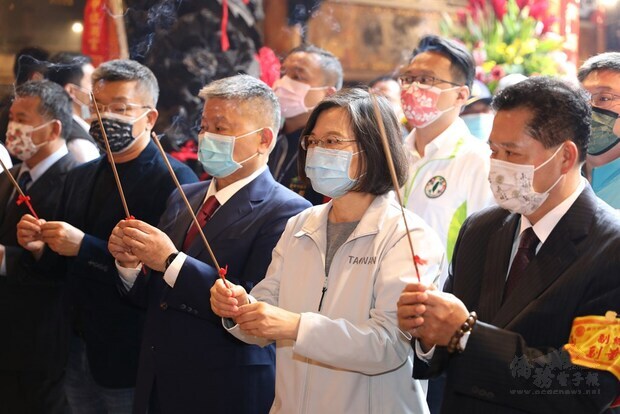
Taichung, April 9 (CNA) Jenn Lann Temple in Taichung's Dajia District began on Friday the annual procession of its main deity, the sea goddess Mazu -- a nine-day, 340-kilometer journey that covers more than 100 temples on the way to Chiayi and back.
Former President Ma Ying-jeou, Legislator Johnny Chiang, who is also chairman of the opposition Kuomintang (KMT), and Taichung Mayor Lu Shiow-yen were there to carry the palanquin at the start of the procession shortly after 11 p.m.
Dajia Mazu's annual procession, which takes the sea goddess on a trip through Taichung, Changhua, Yunlin and Chiayi and back, is the largest religious procession in Taiwan and have always attracted politicians across party lines.
President Tsai Ing-wen, Deputy Legislative Speaker Tsai Chi-chang, Interior Minister Hsu Kuo-yung, and Transportation and Communications Minister Lin Chia-lung, of the ruling Democratic Progressive Party, visited the temple in the afternoon.
The president, accompanied by the temple's chairman, Yen Ching-piao, took part in a ritual to move the deities, including three effigies of Mazu, from their seats in the temple, to be ready for the procession.
After participating in the ritual, Tsai said the Dajia Mazu procession is an important tradition of the country as it shows people's unconditional willingness to help each other.
"No matter what difficulties we face, as long as Taiwanese people stand together, we will make it through," she said.
The president also said she prayed to Mazu for relief of the worst drought facing central Taiwan in 56 years that has led to weekly water supply cuts starting in the region on Tuesday.
Broadcasting Corporation of China Chairman Jaw Shaw-kong, who rejoined the KMT earlier this year, attended a ceremony early in the evening to place Mazu in a palanquin.
Friday's events drew tens of thousands of people, according to the temple. The nine-day procession has been known to draw over a million people each year.
This year, the ceremonies leading to the launch of the procession were streamed live online, while Radio Taiwan International broadcast the rituals in 11 languages to listeners at home and abroad from 8 p.m.
The procession is scheduled to reach Feng Tian Temple in Chiayi's Xingang Township on April 13, where a ceremony will be held to celebrate the birthday of the sea goddess, before the return journey begins that evening.
Apart from people in towns on the route of the procession, who usually prepare food and hold rituals to greet and welcome Mazu, worshipers of the sea goddess across Taiwan also join part or all of the procession to seek Mazu's blessing or show their appreciation to her for fulfilling their wishes.
Due to the ongoing COVID-19 pandemic, Jenn Lann Temple said it will follow the disease prevention measures introduced for last year's event, such as asking people to wear a face mask when taking part in the procession.
Food will be offered to people in boxes, replacing the canteen-style food service in the past, the temple said.
In later years, she came to be regarded as a benevolent protector of all, not just fishermen and seafarers.